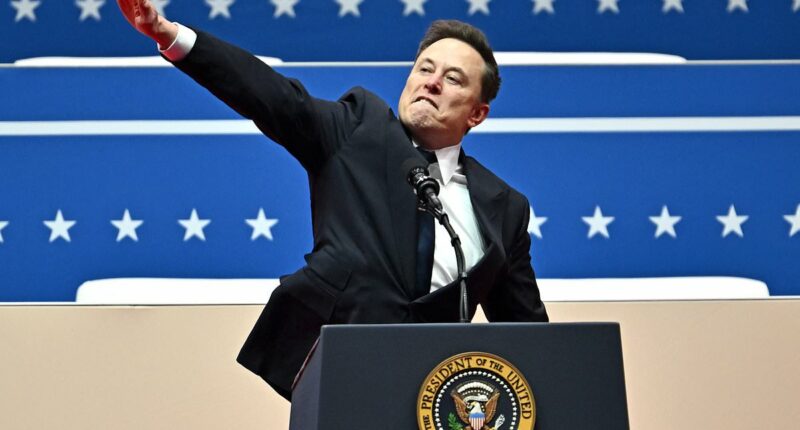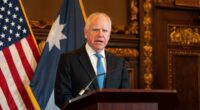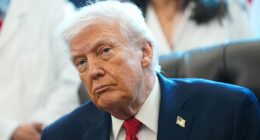Share this @internewscast.com

Elon Musk is on the verge of making history as the world’s first trillionaire, potentially achieving this milestone without even touching a cent from Tesla’s groundbreaking compensation package. The wealth of the CEO of Tesla and SpaceX has skyrocketed so dramatically that experts predict he might surpass the $1 trillion net worth mark by the end of this year. This remarkable financial surge is primarily driven by the soaring valuation of his private space venture and a series of favorable legal outcomes, despite the fact that his controversial Tesla compensation deal remains untouched. Musk’s wealth has ballooned amid a backdrop of political turbulence and a mix of successes across his extensive business ventures. According to Wall Street Journal estimates, Musk’s net worth has reached approximately $726 billion, more than doubling in just a year, positioning him tantalizingly close to the illustrious ‘four-comma club.’
A tale of two companies

The remarkable growth in Musk’s fortune is largely attributed not only to Tesla but also to a significant revaluation of SpaceX, which has been appraised at up to $800 billion in recent secondary share sales. Musk, who owns roughly 42% of SpaceX, could see his personal wealth catapult past the trillion-dollar threshold should the company proceed with a highly anticipated public offering, expected to be one of the most substantial IPOs in history. This financial leap could occur even before Musk receives any compensation from Tesla’s newly sanctioned pay package. This package, contingent on Musk meeting a series of ambitious performance goals, could itself be worth nearly $1 trillion, potentially transforming Tesla into a leader in artificial intelligence and robotics. Meanwhile, Tesla is encountering challenges in the market.
The new EV king

Last Friday, Tesla announced the delivery of 1.64 million vehicles in 2025, marking a 9% decrease from the previous year, which represents its second consecutive annual decline. Furthermore, the company has lost its position as the world’s leading electric vehicle manufacturer, surpassed by China’s BYD, which sold 2.26 million vehicles last year. This downturn is attributed to several factors, including a customer backlash against Musk’s outspoken political views, the expiration of U.S. tax credits, and intensifying global competition, especially in Europe and China. Despite these challenges, Wall Street remains largely unfazed.
Beyond the steering wheel

Investors instead rallied behind Musk’s vision of Tesla’s future as something far beyond a car company. He has repeatedly said he expects software updates to allow hundreds of thousands of Teslas to operate autonomously with zero human intervention by the end of this year. The company is also planning to begin production in 2026of its AI-powered Cyber cab, a vehicle with no steering wheel or pedals. It’s the long-term bet with Tesla as a robotics and artificial-intelligence platform that persuaded shareholders to approve Musk’s record-breaking compensation plan at the company’s annual meeting in November.

Musk’s personal fortune was further supercharged two weeks ago when the Delaware Supreme Court reversed a prior ruling that had blocked his 2018 Tesla pay package, now valued at roughly $139 billion. The decision cleared a major legal obstacle that had hovered over his wealth for years. Meanwhile, SpaceX has continued to push toward full reusability of its massive Starship rocket – a cornerstone of Musk’s ambitions for the moon and Mars – even as he openly discusses building AI data centers in space and factories on the moon. All of this has unfolded against a backdrop of political chaos.

Over the past year, Musk rose to extraordinary influence in Washington, becoming a near-constant presence around President Donald Trump, before their relationship imploded in spectacular fashion. Musk later appeared to soften tensions following the killing of conservative activist Charlie Kirk, and he now appears poised to funnel substantial sums toward Republican candidates ahead of this years midterm elections. Musk has framed the chaos through his long-running fascination with simulation theory – the idea that reality may not be real at all, but rather an elaborate digital construct. During a recent podcast appearance, Musk explained his worldview bluntly. ‘I do have this theory about predicting the future, which is that the most interesting outcome is the most likely,’ Musk said. ‘Another way to think of it is like we could be an alien Netflix series and that series is only going to get continued if our ratings are good,’ he said.

‘If you apply Darwin to simulation theory then only the most interesting simulations will continue. Therefore, the most interesting outcome is most likely because it’s either that or annihilation.’ Musk has been publicly musing about simulation theory for more than a decade, arguing that the rapid evolution of technology, from early video games like Pong to photorealistic, massively multiplayer virtual worlds, suggests that advanced civilizations would inevitably create realities indistinguishable from our own. ‘Given that we’re clearly on a trajectory to have games that are indistinguishable from reality…it would seem to follow that the odds we’re in based reality is one in billions,’ Musk said in 2016. ‘So tell me what’s wrong with that argument.’






